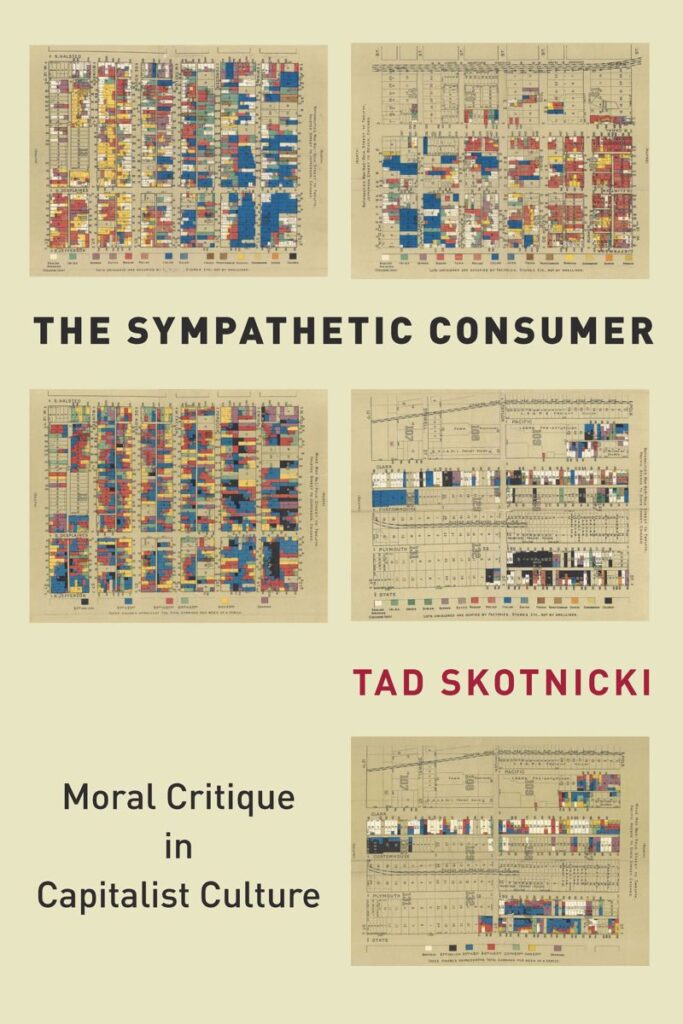
Tad Skotnicki
The Sympathetic Consumer: Moral Critique in Capitalist Culture
Stanford University Books, 2021. 280 pages. ISBN-13: 9781503627734
In The Sympathetic Consumer, Tad Skotnicki provides a comparative historical analysis of consumer activism in the late eighteenth, early twentieth, and early twenty-first centuries. Skotnicki is particularly interested in the ways that people interpret the cultural conditions of capitalism. Using archival data, he investigates the moral justifications that people offer for their consumption. Skotnicki traces three movements that recurred across different capitalist regimes: abolitionism during the late eighteenth century (Chapter 2), consumer-based advocacy at the turn of the twentieth century (Chapter 3), and the fair-trade activism of the present moment (Chapter 7). For Skotnicki, these historical examples of commodity-exchange produced similar interpretations of the relationship between consumption and labor wherein the consumer is located at the center of a capitalist culture. These interpretations invited consumers to imagine the otherwise invisible labor behind the goods that connected them, encouraging consumers to “feel with” those laborers. The Sympathetic Consumer points to this cultural pattern of ideas, “practices, and conditions (pg. 4).”
Skotnicki argues consumption matters in terms of the labor behind consumer goods. Skotnicki turns to Karl Marx’s concept of commodity fetishism to account for the historical recurrence of the sympathetic consumer (which he demonstrates through his three case studies). Like Marx, Skotnicki approaches capitalism as an entire social order that includes social relationships, beliefs, practices, and institutions that exist within the eco-political structures of a capitalist society. The Sympathetic Consumer provides a compelling angle for understanding the ways that social and cultural features evolve through economic and political systems. Thus, sympathetic consumption occupies a moral position that is political and implicates particular power dynamics. Skotnicki establishes a framework for investigating how the conditions of commodity production relate to the meaning and significance of consumption.
While Skotnicki presents a thorough and theoretically grounded analysis, The Sympathetic Consumer does leave some matters unresolved. Firstly, what would an “un-sympathetic” consumer look like? If we reverse the logic that Skotnicki uses to formulate the concept of a sympathetic consumer, then an un-sympathetic consumer is just someone who does not “feel with” the invisible laborer. That feels too simplistic, and I think the book would be stronger if it offered even a brief notion of what the opposite of sympathetic consumption entails. As a reader, another point that I want to highlight is that Skotnicki’s argument does not account for race. He does acknowledge that shortcoming and leaves the door open for future research in that direction. Finally, I am not convinced that his argument works well outside of a Western setting. It would be helpful for Skotnicki to address whether his approach can be applied to less developed capitalist societies. Nevertheless, The Sympathetic Consumer is thought-provoking and has contributive value for fields many fields. Skotnicki does a fantastic job of developing a coherent method for approaching the moral dimensions of every day consuming behaviors.
Key Terms:
Capitalism—a social order structured around historically-specific systems of social relations
Capitalist culture—a form of meaning-making that depends on the tendencies, social relations, and phenomena related to capitalism
Commodity Fetishism—comprises two distinct, but related interpretations tied to a capitalist social order:
- the practical interpretation of goods as anonymous in exchange
- the interpretations of commodity-exchange as natural
Conscious capitalism—a commerce-oriented approach to building purposeful lives and to changing the world
Culture—the ways that people make sense of or interpret their world
Sympathy— a practical and imaginative act of feeling with, not just for, the invisible laborers along the supply chain
ABOUT THE BOOK AUTHOR
Tad Skotnicki is an Assistant Professor of Sociology at the University of North Carolina at Greensboro. His research addresses two key questions:
- How can we understand and account for the role that culture plays in a capitalist social order?
- How can we adjudicate claims about the nature and operation of social systems in holistic terms?
You can learn more about Dr. Skotnicki and his work here.
ABOUT THE REVIEW AUTHOR
L. Nelson Leonard is a PhD student in the Religion in Society track at UT Austin’s Department of Religious Studies. She has training in political science and uses her interdisciplinary methodological skills to address cultural intersections of race and religion. You can learn more about her and her work here!
